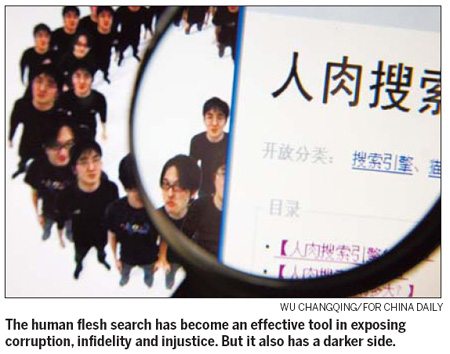Society
Human flesh search could turn predatory
By He Na (China Daily)
Updated: 2010-05-04 07:57
 |
Large Medium Small |
Cyber attacks
China has more than 440 million netizens, and experts say they are growing more sophisticated about how to use the Web to "supervise society" every day.
Their methods have already enjoyed some success, with Lin Jiaxiang and Zhou Jiugeng among the high-ranking officials who have lost their jobs after being embroiled in scandals.

Lin, former Party chief of the maritime affairs bureau in Shenzhen, Guangdong province, attracted the vitriol of Internet users when he was accused of molesting an 11-year-old girl surnamed Chen in a restaurant last October. Pictures and video clips of the incident were posted online, while media reports said Lin, who had been drinking, also told the girl's parents: "I'm an official with the same rank as your mayor. How dare you find fault with me."
|
||||
Zhou Jiugeng, a former real estate official in Nanjing, Jiangsu province, was sentenced to 11 years in prison for accepting more than 1 million yuan ($140,000) in bribes. He was exposed when netizens posted pictures of him driving a luxury Cadillac car, smoking expensive cigarettes and wearing a Vacheron Constantin watch worth about 100,000 yuan.
However, human flesh searches go far beyond simply posting pictures and news, with some analysts claiming it is a potent weapon that often leads to "cyber bullying".
In February, a sex diary allegedly written by Han Feng, a former tobacco bureau chief in the Guangxi Zhuang autonomous region, was published online. In the diary, all women were referred to in code, which set the nation's legion of online detectives on a mission to uncover their real identities.
They quickly identified a college student surnamed Wu as one of the women involved and posted pictures of her online, along with her contact details. However, officials investigating the case later confirmed she had nothing to do with Han - her only connection was she was once chosen as a model to promote tobacco control.
After she was named, Wu received more than 200 calls on her cell phone every day and said she fears the scandal may hamper her job opportunities when she graduates from university.
"Even with the cases that most people applaud, abuse of this supervision still exists, such as exposing a family's phone number, address, family members' working addresses and names," said Zhou Qingshan at Peking University. "Even if the person at the center of a human flesh search did something wrong, or has even committed a crime, what crime did their family commit? Why do they need to be punished?
"I believe the majority of netizens abhor evil and injustice, but the practice of using violence to solve violence (some bloggers actively encourage readers to use details provided to confront the victims of searches) is not the right way for a civilized society."
Dong Yongsen, a member of the China Lawyers' Association's information network and high-tech professional committee, agreed, and said human flesh searches can open a Pandora's box that cannot be shut.
"No matter whether the person involved is right or wrong, these searches will always hurt them," he said, adding that once someone's privacy has been infringed upon online, it is impossible to undo. "Regulations on the Internet and our civil laws do not have specific terms for the protection of privacy."
Although the Chinese government has begun to attach importance to privacy protection in recent years, it is still in its infancy, either in theory or legislative and judicial phases. "Privacy rights is an international controversial issue but up until now there is no clear boundary to the degree of its openness," said Jiang Qizheng, secretary-general of the Chinese Academy of Social Science's information research center. "More than a decade has passed since the Personal Information Protection Law was proposed but it is still under construction.
"Without proper control and regulation, human flesh searches can easily develop into cyber violence," he added.
Many Internet experts and legal professionals are now also calling for websites that provide platforms for human flesh searches to use restraint and to take legal responsibility to protect people's right of privacy.
"Human flesh searches could become a very effective network for mutual aid and public supervision if it receives proper guidance," said Zhou Qingshan.
But can those who run these websites really tame the beast they have helped nurture?
"This is not my website's responsibility," said Zhang Leyi, founder of orionchris.cn, a popular Chinese blogging site. "We do not ask netizens to carry out these searches. Our contributors just write what is true. People need to be able to tell right from wrong by themselves."
Netizens, meanwhile, appear opposed to any suggestion of weakening the potential power of human flesh searches.
Several cities, including Suzhou in Jiangsu province, tried to ban the practice in January. However, the plan was scrapped due to outcry among Web users. In a recent online poll by People's Daily, only 4 percent of respondents backed the proposed legislation.











